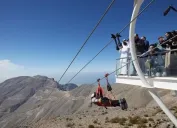This Is Why You Should Take All Of Your Vacation Days
Get thee to Belize (or The Maldives, or wherever), stat.

Maybe it's the stress of the current socio-political climate, or maybe it's the need to take a social media detox given the rise of tech addiction, but, whatever the reason, Americans took more vacations days in 2017 than they did in 2016. How many more? A measly half day.
Project: Time Off, a group affiliated with the U.S. Travel Association, recently released findings on American employees and the way they spend their time off. Between January 4th and 23rd, 2018, they conducted online interviews with 4,349 American workers who work more than 35 hours a week and receive paid time off from their employer.
They found that 52 percent of Americans are still not using all of the vacation time they earn, meaning a whopping 705 million days went unused in 2017 overall. According to the data, those unused days could have generated 1.9 million jobs and generated $255 billion for Americans. Instead, they went to waste.
The 17.2 days of vacation that an average American took in 2017 marks the highest level for American vacation usage since 2010, when it hit 17.5 days, but that's still a far cry from the 20.3 days that the average American took between 1978 and 2000.
What's worse is that, of those 17.2 days, only an average of 8 are actually spent traveling. Nearly a quarter of Americans don't travel at all, even though the majority (84 percent) said that using their vacation days to see the world was important to them.
The significance of this cannot be understated, given that those who use most of their time off to travel reported feeling 30% more happy with how they spent their vacation days than those who did little to no traveling at all. Those who used their vacation days to travel also reported being much more satisfied with their job, company, personal relationships, and their physical health and well-being.
So if Americans want to travel, have the time to do so, and know it'll make them happier, why aren't they doing it?
Some of the barriers to traveling reported by Americans include money issues, kids, pets, and safety concerns. But the people who left the most vacation days unused (61 percent) did so because they were worried it would make them look replaceable at work.
Perhaps that's the secret behind the rise of the "workcation"–a nascent trend that's particularly popular among Millennials–which involves maintaining their regular work schedule while traveling, thereby enabling them to experience another country without having to sacrifice any time off.
Even if you're an old-fashioned, clock-in/clock-out kind of employee, you shouldn't be worried that taking time off to see the world will jeopardize your job.
The study found that there's a disconnect between the way employees and managers view vacation time: 62 percent of employees said their company discourages, sends mixed messages, or says nothing about vacation time, and another 54 percent think their company doesn't even want them to talk about their vacation with colleagues when they return. But 70 percent of managers said they want employees to use all of their time off, and 64 percent claimed they should feel free to talk about the trip when they return.
Almost half of the managers said that, when they do turn down proposed vacation days, it's because they weren't given enough notice. If you do want to amp up the amount of traveling you do this year, consider planning ahead. After all, the study also found that those who planned their vacation far in advance were 10 percent more likely to use up all of their days. And if you wants more of those days, just master Our Secret Trick For Scoring More Vacation Time At Work.
To discover more amazing secrets about living your best life, click here to sign up for our FREE daily newsletter!





















